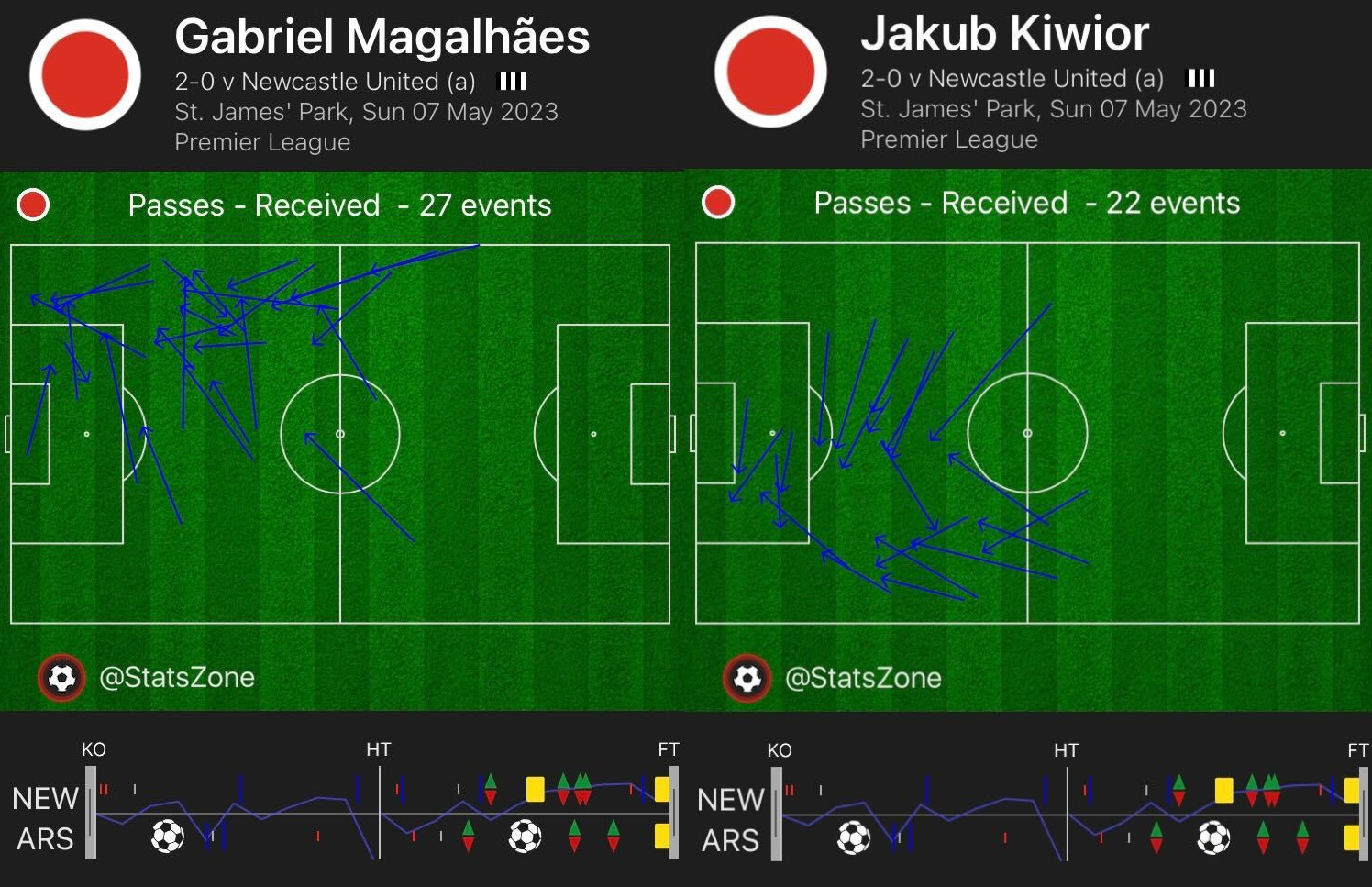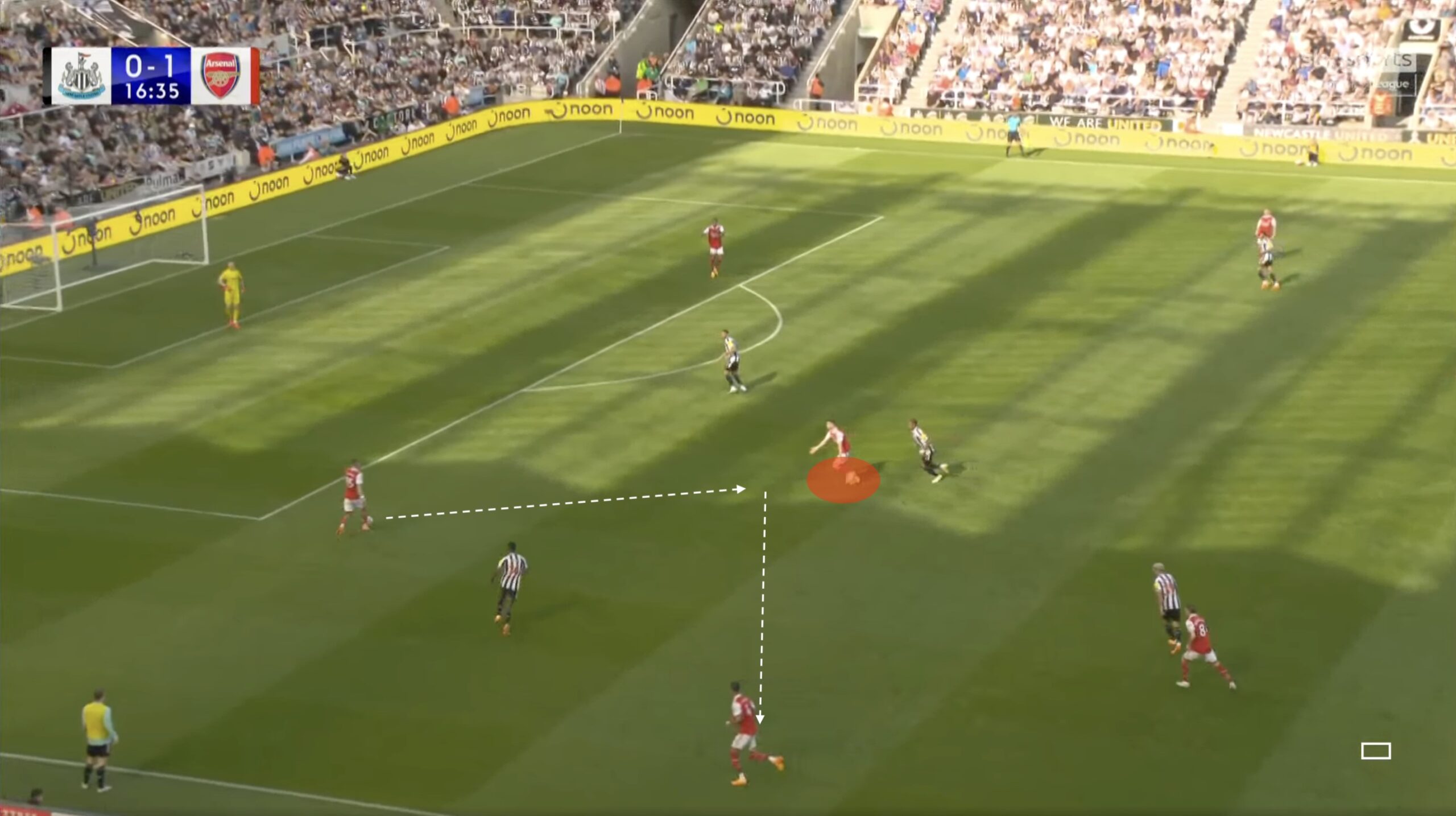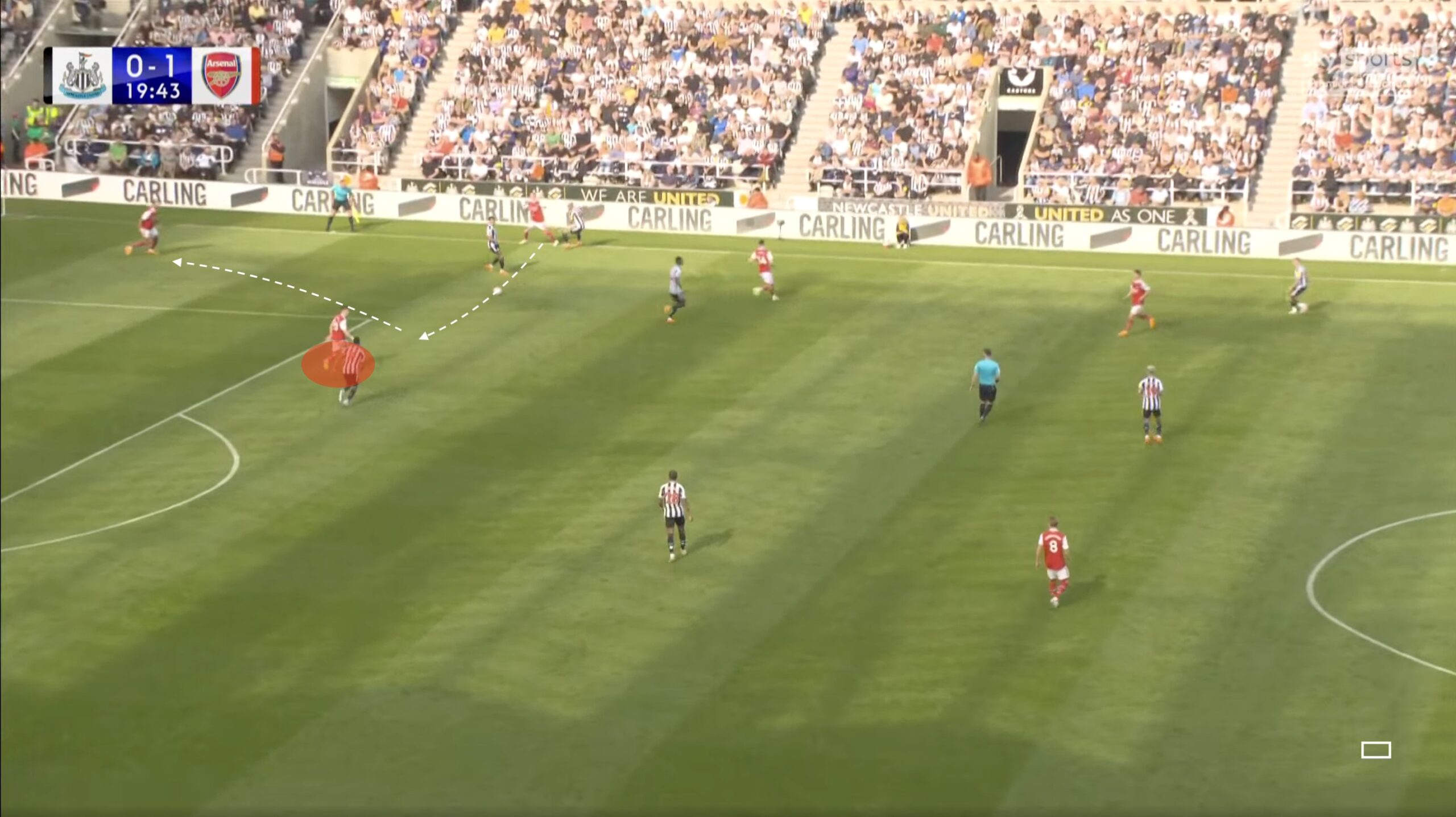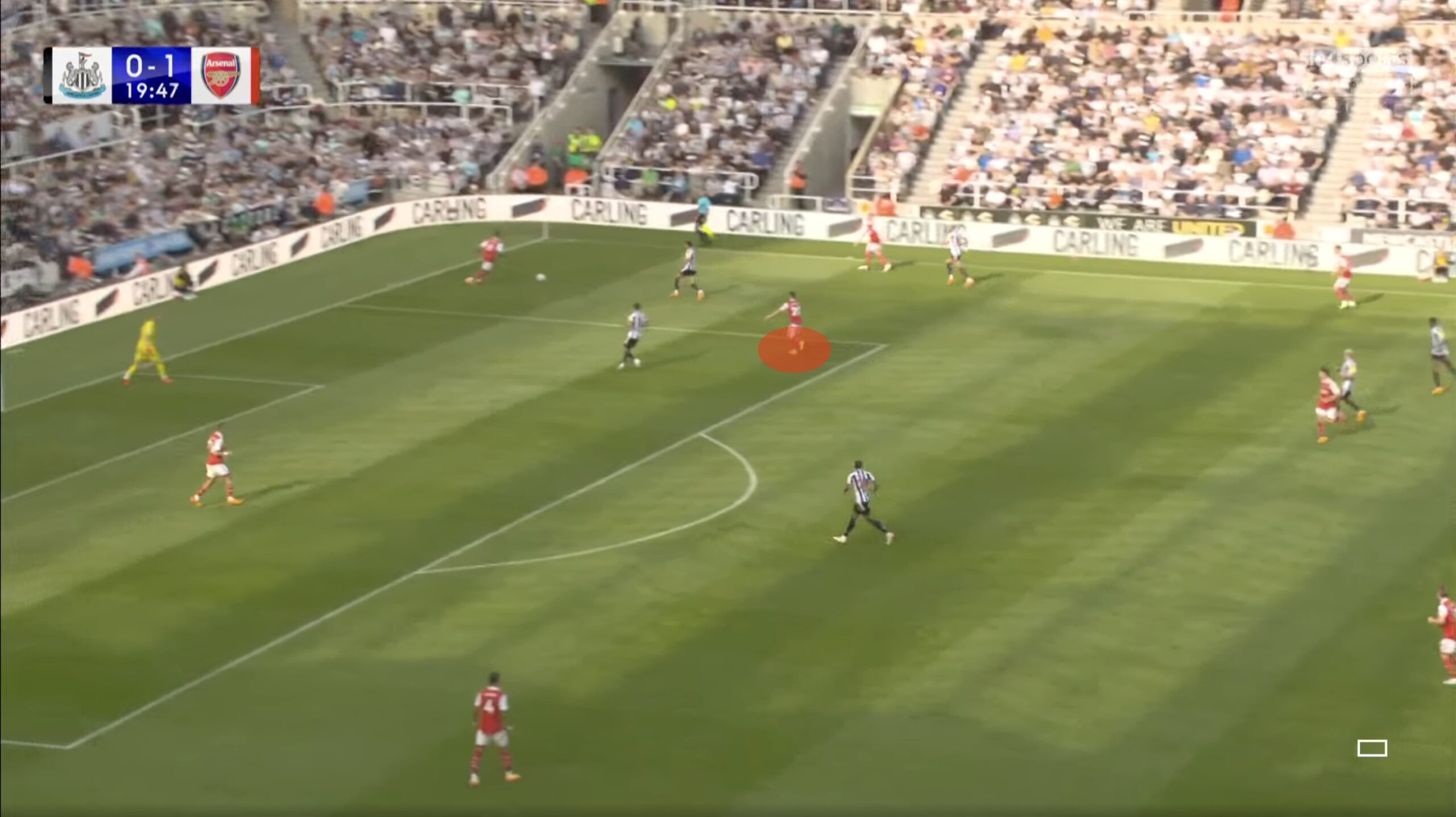Generally speaking, there are two ways football teams and their managers often go when things aren’t going well. In terms of making changes, a manager can lean into keeping things tighter with more physical players and a less expansive game-plan. Or a manager can try to get back on track by selecting his most technically gifted players and figuring it our from there.
Arsenal did compete physically at Newcastle, and that was absolutely crucial, but over the past week it has been the introduction of players more gifted in possession — with a mixture of more quality and better decision making — that has returned Mikel Arteta’s team to winning ways.
One is Jakub Kiwior, who Arteta resisted using until after the defeat at Manchester City. Hindsight is, as always, 20/20 and nobody knows how the Pole may have fared in previous games, not being used to the system, being dropped into a side not on top form and being used on his unfavoured side. Kiwior’s performances against Sporting and Liverpool (from the bench) hardly demanded trust in his ability to stablise a defence that had begun to struggle even when William Saliba was still available.
Arteta stuck with Plan A but with Plan B parts for the four-game winless run but has (even if not quickly enough for some) reacted now. He is still a young manager and still learning himself, we have to concede that, and he has learnt brilliantly so far.
With Kiwior brought in, Plan A has been adapted to suit him. Arteta doesn’t want left-footed centre-backs on the right (or vice versa) because they can end up shuffling back inside, rather than playing the ball down the line, making it easier to press them into costly mistakes. So he has not lined Kiwior up on the right, but rather in the centre of the pitch, with Gabriel pulling wider in possession.
Gabriel and Saliba tend to remain tight in build-up but here, like against Chelsea in midweek had Gabriel shifting wide to the left touchline and White tucking in, rather than moving forward, so there was more of a back three as Arsenal played out from the back. It’s clear from how and where the pair received their passes that their roles, despite both playing centre-back, were very different on the ball.
Kiwior kept things simple for the most part and his passing was good, finding balls into midfield with his favoured left foot as well as shifting the ball across to Gabriel (or Ramsdale) as he kept things moving.
Defensively, the shift meant Ben White played deeper than he often does, with Arsenal a little less aggressive at the very top of the pitch and pressing balls into the midfield rather than the centre-backs and passes into the fullbacks. It was this midfield press that saw us win the ball, stealing it from Bruno Guimaraes, before winning the free-kick that led to the opener.
In the other change made this week, ahead of the backline, there was Jorginho.
“He was exceptional. He was man of the match,” Arteta said after Sunday’s game. “There were question marks because it was going to be really physical but you want to go physicality against physicality, we’d have no chance to win the game, so we had to try for something different. I think he understood the game really well, he’s a really intelligent player, he gives a lot of security to the team. He dominated the game in many moments.”
Arsenal absolutely did match Newcastle physically but they also made sure that that only had to happen in moments. In others, the sting was taken out of the game and Jorginho was absolutely central to that. The Italian had five touches in our box — Thomas Partey has had more in just one appearance all season — and 22 touches in our third — Thomas Partey has had more in just one appearance (way back on the opening day) this season.
Arsenal have needed more serenity in those areas and Jorginho is never afraid to take the ball off of his defenders and play it again with as few touches as possible. He offers himself for the ball no matter how much pressure he is under and he calmly moves it on, without trying anything flashy, in a low-risk way.
Newcastle play with huge intensity but Jorginho was perfectly suited for stopping their press from helping them steal the ball. Below, Arsenal are in a tight spot but Zinchenko trusts the midfielder, who glances over his shoulder and plays the ball back to Gabriel in space …
… before shifting between the two Newcastle players and, with space to turn, asks for the ball back through a tight gap.
Gabriel went down the line instead and excellently found Xhaka to launch the attack that saw Martinelli go through one-on-one. Jorginho’s constant bravery to take the ball in any situation helped Arsenal play out from the back against a team that can press really, really well.
And picking him does not have to mean a less secure performance defensively. First off, you can’t concede when you have the ball and Jorginho helps Arsenal keep it. Secondly, no player on the pitch made more ball recoveries than the Italian (nine) on Sunday and he made the same number against Chelsea last week with only N’Golo Kanté (10) making more. He is not big, he is not quick, but he reads the game well and snaps into challenges and onto loose balls.
One last thing that was of massive use in Sunday’s 2-0 win was Martinelli’s ability to drive with the ball. The Brazilian didn’t start on Tuesday and there have been calls to use Leandro Trossard more often in recent weeks. But Martinelli’s ability to carry the ball over long distances is huge, especially in big games and away from home, with the second goal at Newcastle the obvious example of a threat that was evident throughout.
On average in the Premier League this season, the winger carries the ball 234 yards per 90 minutes. Of his 234 yards per 90 this season, 108 yards are towards the opposition goal. So, looked at it another way 46% of the distance Martinelli has travelled with the ball this season has taken him closer to goal.
At Newcastle he carried the ball 190 yards in total but 121 yards — 63.7% — were progressive. He saw less of the ball but was more direct than he tends to be. In each of the nine games with more than 121 progressive yards carried this season he has had more touches.
There are times when Arsenal maybe play a pass too many and this looked like a concerted effort, as did the passes that slipped Martinelli and Saka in behind for one-on-ones in the first half, to get at the opposition quicker and exploit the space in behind a little more regularly.
If Arsenal can add that to the attack, and Arteta can keep learning to adapt to the opposition and what’s available to him — and he is still learning, after all — then another step forward is within reach for this team next season and beyond.






